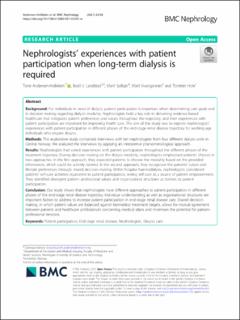| dc.contributor.author | Andersen-Hollekim, Tone Elisabeth | |
| dc.contributor.author | Landstad, Bodil | |
| dc.contributor.author | Solbjør, Marit | |
| dc.contributor.author | Kvangarsnes, Marit | |
| dc.contributor.author | Hole, Torstein | |
| dc.date.accessioned | 2022-09-22T08:26:58Z | |
| dc.date.available | 2022-09-22T08:26:58Z | |
| dc.date.created | 2021-02-19T10:42:06Z | |
| dc.date.issued | 2021 | |
| dc.identifier.citation | BMC Nephrology. 2021, 22:58 1-10. | en_US |
| dc.identifier.issn | 1471-2369 | |
| dc.identifier.uri | https://hdl.handle.net/11250/3020554 | |
| dc.description.abstract | Background For individuals in need of dialysis, patient participation is important when determining care goals and in decision making regarding dialysis modality. Nephrologists hold a key role in delivering evidence-based healthcare that integrates patient preferences and values throughout the trajectory, and their experiences with patient participation are important for improving health care. The aim of this study was to explore nephrologists’ experiences with patient participation in different phases of the end-stage renal disease trajectory for working-age individuals who require dialysis. Methods This explorative study comprised interviews with ten nephrologists from four different dialysis units in Central Norway. We analysed the interviews by applying an interpretive phenomenological approach. Results Nephrologists had varied experiences with patient participation throughout the different phases of the treatment trajectory. During decision making on the dialysis modality, nephrologists emphasised patients’ choices in two approaches. In the first approach, they expected patients to choose the modality based on the provided information, which could be actively steered. In the second approach, they recognised the patients’ values and lifestyle preferences through shared decision-making. Within hospital haemodialysis, nephrologists considered patients’ self-care activities equivalent to patient participation, seeing self-care as a source of patient empowerment. They identified divergent patient–professional values and organisational structures as barriers to patient participation. Conclusion Our study shows that nephrologists have different approaches to patient participation in different phases of the end-stage renal disease trajectory. Individual understanding as well as organisational structures are important factors to address to increase patient participation in end-stage renal disease care. Shared decision making, in which patient values are balanced against biomedical treatment targets, allows for mutual agreement between patients and healthcare professionals concerning medical plans and minimises the potential for patient–professional tensions. | en_US |
| dc.language.iso | eng | en_US |
| dc.publisher | BMC | en_US |
| dc.relation.uri | https://bmcnephrol.biomedcentral.com/articles/10.1186/s12882-021-02261-w | |
| dc.rights | Navngivelse 4.0 Internasjonal | * |
| dc.rights.uri | http://creativecommons.org/licenses/by/4.0/deed.no | * |
| dc.title | Nephrologists’ experiences with patient participation when long-term dialysis is required | en_US |
| dc.title.alternative | Nephrologists’ experiences with patient participation when long-term dialysis is required | en_US |
| dc.type | Peer reviewed | en_US |
| dc.type | Journal article | en_US |
| dc.description.version | publishedVersion | en_US |
| dc.source.pagenumber | 1-10 | en_US |
| dc.source.volume | 22:58 | en_US |
| dc.source.journal | BMC Nephrology | en_US |
| dc.identifier.doi | 10.1186/s12882-021-02261-w | |
| dc.identifier.cristin | 1891653 | |
| cristin.ispublished | true | |
| cristin.fulltext | original | |
| cristin.qualitycode | 1 | |

